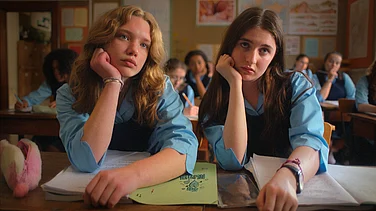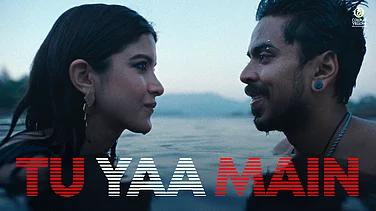Irrfan Khan passed away three years ago but continues to live in the memories of Anup Singh, the director of his last film ‘Song Of Scorpions’. After traveling to the finest film festivals across the world including Locarno Film Festival, the film was released in India on April 28. Set within the deep desert landscapes of rural Rajasthan, the film features Irrfan along with Golshifteh Farahani (About Elly fame) in the lead role along with a cameo by the legendary actress Waheeda Rehman.
In this conversation with the writer, Anup Singh talks about how he selected the star cast for the film and how difficult is it to scuffle between two countries.
Q. How did the selection of the star cast happen, especially the faces that were not seen before?
Golshifteh Farahani is not as widely known in India as she is elsewhere. Casting her was this film’s kismet! Irrfan and I were at an international film festival with Qissa. At the end of our film’s screening and the Q&A that followed, we were walking down from the podium, when we saw this gorgeous woman, smiling widely, making her way through the crowd towards us. She stopped before us and said, “Coffee?” Of course, we were not going to say “No” to Golshifteh Farahani!
We spent the next two days watching films, having all our meals together, and talking non-stop about films and acting. As you might know, Golshifteh is a person living in exile. She lives in the constant pain of separation from her country, Iran, and her family. However, instead of allowing this pain to embitter her, she accepted her exile as a talisman, a magical gift that opened the doors to what had been her ceaseless search since childhood: just who am I? She has taken this quest to fearlessly open herself to the diverse other possibilities within her. This is what makes her the exciting, multidimensional actress she is. Talking to her, I soon realized that Golshifteh’s journey as a person and artist in many ways mirrored Nooran’s, the female protagonist’s journey in ‘The Song of Scorpions’.
Nooran, too, has to journey into exile from her own body and identity, fight her primal instinct to seek vengeance and, finally, learn to celebrate herself. At the end of those two days, I knew Golshifteh was the ideal actress to play Nooran.
We had innumerable auditions in Mumbai, Delhi, in many cities of Rajasthan to find an actor for the role of ‘Munna’. He was a pivotal character in the film, playing Irrfan’s friend as well as henchman, ready to be used horrifically because of his hidden desire for his friend. We must have auditioned 50 actors, with no breakthrough, but then Shashank Arora agreed to audition too. That surprised and impressed me deeply as he had just played the lead role in the darkly radiant film, ‘Titli’. Shashank walked into the audition dressed in grimy trousers and a shirt, hair tousled, unwashed. Just right for ‘Munna’ And, then, in the next hour of the audition, I saw what makes for a miraculous actor.
First, an ability and readiness to not only shatter all notions of the body as a carrier of one’s self-image, but, just as importantly, not to do that just because one has learned the skills, but because it opens the body to identities completely foreign to it.
Shashank was before my eyes metamorphosing from a handsome young actor to a brute, to a tender friend, to a scorpion with no moral compass. It was an astounding audition and, ever since, I have been hoping to find myself in another such audition with an actor. But no other actor, as yet, has frightened me with his talent as Shashank did that day. I would very much like to say something about Kritika Pande, who plays Golshifteh Farahani’s friend in the film. A recent acting graduate from FTII, Kritika also came for an audition. Naive, anxious, she kept forgetting her lines or, strangely, staring blankly for long moments at nothing in the middle of a scene. And yet, that did not matter at all. Because even when standing still, there is an ecstatic hum to her whole body. An almost childish glee in simply being alive.
Once we could make her aware through rehearsals that she should listen to the melody of her body and follow its joyous movement in any direction, Kritika became alive as a deer. A simple turn of her head to look at you was like coming face-to-face with the source of life.
And last, but with implacable respect, a word about the legendary Waheeda Rehman. Waheeda Ji’s role in ‘The Song of Scorpions’ carries the primal impulse from which the film emerged. It’s a role that holds my deepest beliefs and hopes. Obviously, I needed an actress whose very presence, whose every gesture would give breath to this secret source of the film. Once I started thinking of the casting, Waheeda ji kept recurring in my thoughts. The gentleness and insight with which she looks at you, and the grace of her movements were very important to me - she’s like the incarnation of a song of yearning that we all carry within ourselves. The song fills us with the desire to live more fully. I knew very early that for the role of the grandmother, I wanted to cast Waheeda ji.
I also knew that she was not keen to act anymore and had, more or less decided, that she was retired. I invited her to a screening of Qissa, and the film moved her profoundly. And then I told her just one sentence really about the character I wanted her to play in ‘The Song of Scorpions’. I told her that she had the power to heal poison by singing. Every time she sings, the desert blossoms. I think the idea so charged her imagination that she could not say ‘no’ and even agreed to sing one song for the film. So, for the first time in her whole career, we’ll hear Waheeda ji singing in her own voice in ‘The Song of Scorpions’!
Q. We see how compelling you become as a filmmaker while making any film and the 'Song of Scorpions' is no different. What is your idea of cinema and how much of that is reflected in this film also?
AS: My films deal with very fragile and vulnerable moments in the life of my characters. The violence of our time has violated some of the most cherished and celebrated beliefs that we share as a nation. My films, I believe, speak directly to this sense of helplessness that we all carry surrounded by this violence.
The hope that my films carry is that we’ll learn to share again as we watch the film together our deep-rooted bonds with each other, not only in terms of our secret, fragile feelings but also in terms of our folk-tales and various other narrative traditions. Films, such as mine, face a wall of prejudices and the main accusation is: it’s not entertainment! I find that attitude degrading for us as an audience. Mainstream cinema has created a singular, formulaic notion of “entertaining,” and they use that term to batter down anything different.
This helps them to assert their own values. I don’t deny these values, but I think I would like to propose another concept to our audiences. How about a cinema that brings back a sense of wonder to our being and our world? A cinema that celebrates the wonder of our existence. Those are the films I believe in.
Q. Anup, is shuffling between two countries tough as a filmmaker or would you like to call it an opportunity to explore two different ideologies and the world of cinema?
AS: What I saw from my very first film, ‘The Name of a River’, is not simply that this eternal journey between countries, cultures, and peoples allows me to see differences and similarities, it gives me an outsider’s view that allows me to see ‘more’ and more critically.
What it also does, simultaneously, is that it allows different countries, cultures and people to travel with me! Everything I see, then, I am forced to view again and then again and again from other points of view. Every object has multiple stories. It’s not that one story opens to another or contradicts another.
All stories congregate simultaneously. The cinema that emerges from this medley, I hope, is one of celebration of everything we are not, what we don’t know, what is far away, what is foreign, and yet it is us.
Q) What is next after this?
AS: Irrfan and I had numerous projects planned together, but after his passing away, I need to go elsewhere for a while, at least a film or two, before I return to India. My next project, therefore, is set in Senegal, Africa, and France. It will be in French and is the tale of a daughter abandoned almost 25 years ago with her mother, who comes to Senegal to confront her father. She is unsure whether she will destroy him or forgive him. However, I am working on adapting an Indian novel by Saikat Majumdar, called ‘Firebird’. The story has so taken possession of me that I am looking forward to making it as quickly as possible.


























